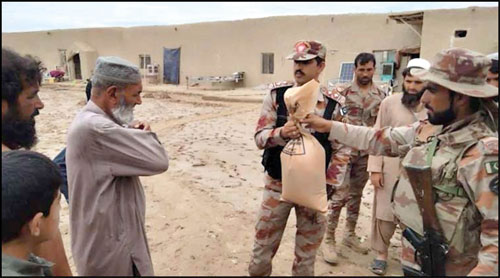Pakistan Army on Monday continued relief and rescue operation in flood-hit areas in Sindh, Punjab and Balochistan provinces as the country faces record monsoon rain spells, says Inter Services Public Relations (ISPR). Pakistan Army’s troops were engaged with civil administration in assisting relief and rescue operation in the three provinces. It said that the troops were engaged in shifting affectees to safe areas besides also distributing ration, cooked food among them.
Army troops reached flood affected area of Saim Nullah in district Khairpur to safeguard flood affectees after over 200 houses got badly affected due to heavy floods in the area. Army troops from Pano Aqil Garrison took part in relief operation and shifted flood affected people to the safe locations and provided them medical aid.
The military’s media wing shared that Pakistan Army and FC troops continue to assist civil administration in flood rescue and relief operations in Quetta, Pishin, Qila Saif Ullah, Ziarat, Zhob, Loralai and Noshki. “Teams of Pakistan Army, FC, PDMA and civil administration are shifting people to safer places where they are being served with cooked food and other amenities. Relief camps have been established in Naseerabad, Duki and Lasbela areas,” it said.
The ISPR further shared that free medical camps were also established in affected areas while all out efforts are being made to restore communication infrastructure at earliest. Beside free inter and intra district links, Road Zhob-DI Khan has also been restored. Punjab Army troops are carrying out relief activities and providing medical care to affected population in Vehari, Rajan Pur and Dera Ghazi Khan.
Meanwhile two army helicopters have joined rescue and relief operations in flood hit areas of Dera Ghazi Khan and Rajanpur districts of south Punjab on Monday, just a day after the DG Khan administration sought army’s help for flood-stranded people for delivery of food items and tents. Commissioner DG Khan Usman Anwar told media persons that aerial operation to provide aid to the stranded communities was necessary as the hill torrents had badly eroded the road communications infrastructure making access by road nearly impossible to some areas.









